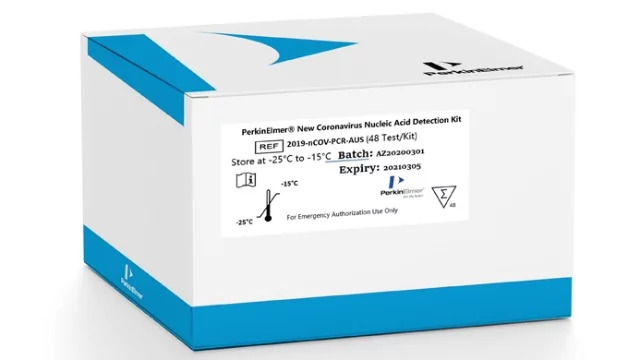
Photo Credit: PerkinElmer
PerkinElmer, Inc. announced on Jan 14, 2021 that its PerkinElmer® New Coronavirus Nucleic Acid Detection Kit received Emergency Use Authorization (EUA) from the U.S. Food and Drug Administration (FDA) to test individuals without symptoms or other reasons to suspect COVID-19 infection.
According to a new model from The Journal of the American Medical Association’s Open Network developed by researchers from the Centers for Disease Control and Prevention, close to 60% of total COVID-19 transmissions come from those who have no symptoms, signaling that silent spreaders are the ones most often passing the virus around without knowing it.
For asymptomatic carriers, diagnostic testing is essential to identify infected individuals, and thereby provides a better chance of getting infectious individuals into isolation to avoid spreading the disease further. The ability to quickly identify asymptomatic individuals provides significant public health value. Moreover, based on comparative data released by the FDA, the PerkinElmer test kit has the lowest Limit of Detection (LoD) among the authorized COVID-19 molecular diagnostic tests reported, deeming it the most sensitive assay. PerkinElmer’s RT-PCR assay originally obtained FDA EUA in the spring of 2020.
“The data is clear – it’s imperative we have reliable and accurate testing for asymptomatic individuals, especially as we’re seeing new strains of the virus appear that are even more contagious,” said Masoud Toloue, Ph.D., Vice President & General Manager, Diagnostics, PerkinElmer.
Previously, the FDA issued EUA to allow sample pooling with the PerkinElmer New Coronavirus Nucleic Acid Detection Kit to increase the number of individuals who can be tested without increasing resources. Additional testing mechanisms, including the use of saliva as a sample type, are also on the horizon. SARS-CoV-2 testing using saliva is less invasive, reduces the risk of exposure to healthcare workers involved in sample collection, and lessens the need for frequent replacement of personal protective equipment.




